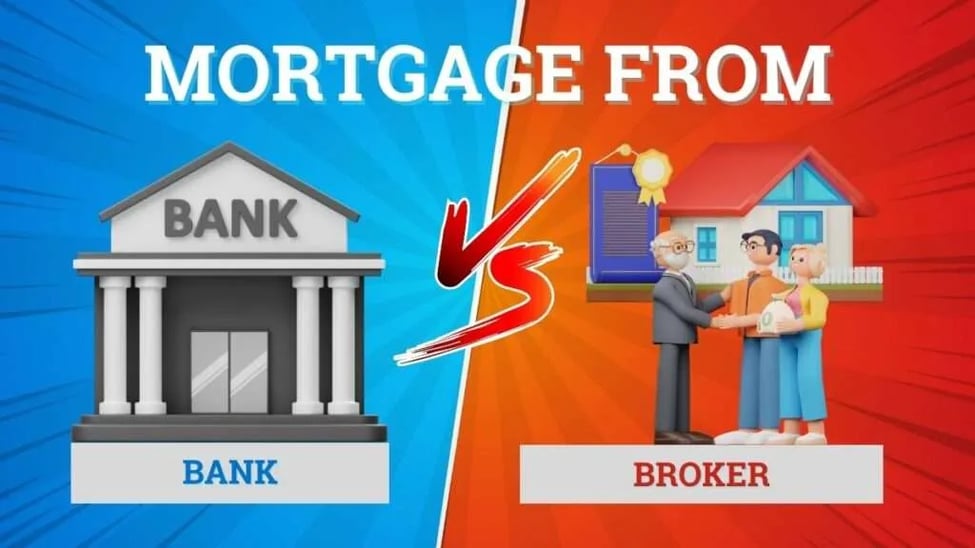When it’s time to secure a mortgage, one of the first questions you’ll face is whether to go directly through a bank or work with a mortgage broker. Both options have their benefits and drawbacks, and the best choice often depends on your unique financial situation. Let’s explore the differences, pros and cons, and how to decide which route might work best for you.
What’s the Difference Between Banks and Mortgage Brokers?
The key difference between banks and mortgage brokers lies in the variety of options they can provide. A bank offers mortgage products exclusively from its own portfolio, while a mortgage broker has access to products and rates from multiple lenders. This wider selection allows brokers to shop around for competitive rates and terms that fit your needs. Brokers may also have access to volume discounts due to their ongoing relationships with lenders.
The Pros and Cons of Banks
Advantages of Going Directly Through a Bank
Familiarity and Trust: If you’ve banked with a particular institution for years, the familiarity can make the mortgage process feel more comfortable.
Leveraging Relationships: Long-standing relationships with your bank might help you secure better rates or terms.
Disadvantages of Banks
Limited Options: Banks can only offer their own mortgage products, which means you won’t have access to a wider range of rates and terms.
Stricter Approval Criteria: Some banks have higher thresholds for mortgage approvals, which could mean you’d need to shop around if you don’t meet their criteria.
The Pros and Cons of Mortgage Brokers
Advantages of Working with a Mortgage Broker
Access to Multiple Lenders: Mortgage brokers can present you with options from various lenders, increasing your chances of finding the best rate and terms.
Discounted Rates: Brokers often negotiate volume discounts that individual borrowers wouldn’t be able to access directly.
Fiduciary Duty: Brokers are legally obligated to act in your best interest, ensuring they work to secure the best deal for you.
Access to Secondary Lenders: Brokers can connect you with “B-Lenders,” who may have easier approval criteria—though this might come with slightly higher rates.
No Out-of-Pocket Cost: Brokers are typically paid by the lender who gets your business, meaning their services are free to you.
Disadvantages of Working with a Mortgage Broker
Not All Lenders Participate: Some lenders don’t work with brokers, so you might miss out on certain products by relying solely on a broker.
More Paperwork: Without an existing relationship, the process might take longer and require more documentation, which could be challenging if you’re on a tight timeline.
Exploring Other Options for Finding a Mortgage
While banks and mortgage brokers are the most common choices, they’re not your only options. Consider these alternatives:
Online Comparison Tools: Websites that compare mortgage rates can give you an idea of the best deals available.
Credit Unions: Often offer competitive rates and personalized service.
Trust Companies and Insurance Companies: These financial institutions may have unique mortgage products.
Private Lenders: A viable option for borrowers who don’t meet traditional lenders’ criteria, though rates may be higher.
Should You Choose a Bank or a Mortgage Broker?
Ultimately, the decision depends on your priorities and circumstances. Here are a few questions to consider:
Do You Value Convenience? If you already have a good relationship with your bank, going directly through them might save time and effort.
Do You Want More Options? If you’re looking for competitive rates or specific terms, a mortgage broker can provide a broader range of choices.
Do You Have Time to Shop Around? Whether you choose a bank or broker, it’s always wise to compare quotes and use them as leverage to negotiate better terms.
Final Thoughts: Finding the Best Mortgage for You
Choosing between a bank and a mortgage broker isn’t always a clear-cut decision, but taking the time to weigh your options can lead to significant savings. Whether you prefer the familiarity of your bank or the variety offered by a broker, shopping around and comparing rates is the key to securing the best mortgage deal. Remember, this is one of the most important financial decisions you’ll make, so it’s worth putting in the effort to get it right.

